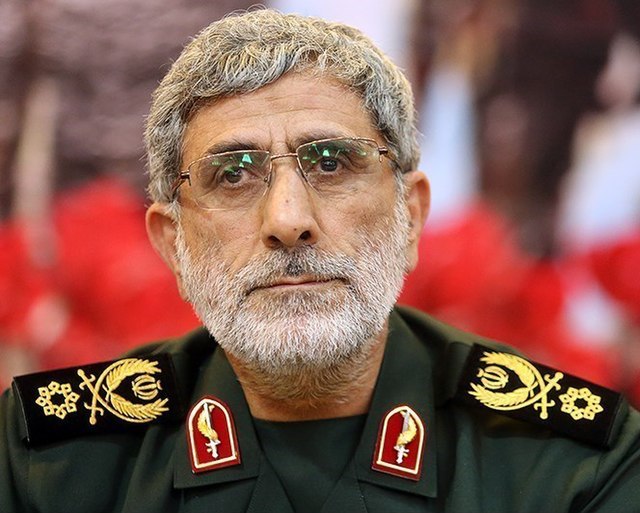In the fog of war and intelligence operations across the Middle East, few figures have attracted as much speculation as Iranian General Ismail Qaani, commander of the Revolutionary Guards’ Quds Force. Following a series of Israeli military successes against Iranian proxies in Lebanon, unfounded rumors have emerged suggesting that Qaani might be an Israeli Mossad agent—claims that are categorically false and appear to be the product of wartime conspiracy theories rather than credible intelligence.
The speculation surrounding Qaani began after his mysterious disappearance following the assassination of Hezbollah leader Hassan Nasrallah in September 2024. Qaani has not been heard from since Israeli strikes on Beirut late last week, according to Iranian security officials. His absence came at a particularly sensitive time, as Israel had achieved unprecedented success in targeting Iranian proxy leadership across the region through what it called “Operation Rising Lion.”
Qaani traveled to Lebanon shortly after Nasrallah’s death in an Israeli airstrike, but his subsequent disappearance sparked wild theories about his fate and loyalties. The rumors gained momentum when he was scheduled to attend a meeting with presumed Nasrallah successor Hashem Safieddine, who was later killed in an Israeli strike. The fact that Qaani was absent from this fatal meeting, despite being expected to attend, fueled suspicions among some Iranian circles.
The conspiracy theories reached their peak in October 2024 when various Middle Eastern media outlets began reporting that Qaani was under investigation by Iranian authorities. Reports from outlets like The Sun, Middle East Eye, and Hindustan Times in October 2024 suggested that Iranian authorities placed Qaani under house arrest and interrogated him, suspecting intelligence leaks that enabled Israeli operations.
Arabic media outlets, including Saudi-owned Al-Arabiya, suggested that Qaani was under surveillance and isolation following successful Israeli assassinations of Iranian leaders. UK-based Middle East Eye reported that he was alive but under investigation in Tehran, while Sky News Arabic even claimed he suffered a heart attack during interrogations—all reports that remained unconfirmed and unverifiable.
The truth appears far more mundane than the conspiracy theories suggest. Qaani was under guard and being questioned about Iranian security breaches following the devastating intelligence failures that allowed Israel to eliminate Iranian proxy leadership systematically. This is a standard security review following major operational failures, not evidence of treachery.
In October 2024, Qaani made a public appearance at what Iranian media described as “victory” celebrations in Tehran’s Revolution Square, effectively dispelling rumors of his death or defection. The Iranian Embassy in India has strongly refuted the assertions about Qaani being a Mossad spy and labelled them as fake news.
General Qaani, Commander of IRGC Quds Force, seen among Tehran’s rally attendees today following the last night attack on the US Al Udeid Airbase in Qatar.#Iran pic.twitter.com/bOvPaY3SAt
— Iran Nuances (@IranNuances) June 24, 2025
Esmail Qaani, 62, assumed leadership of the Quds Force in 2020 following the U.S. assassination of his predecessor, Qasem Soleimani. The Quds Force serves as Iran’s external operations arm, responsible for managing Tehran’s network of proxy forces across the Middle East, including Hezbollah in Lebanon, various Iraqi militias, and other regional allies.
The force has been directly implicated in numerous terrorist attacks globally, including the 2012 bombing of a tourist bus in Bulgaria that killed five Israelis, and assassination attempts against Israeli diplomats in Thailand, Georgia, India, and other countries. Given this background, it’s understandable that Qaani would be a high-value intelligence target for Israel.
The rumors about Qaani being a Mossad agent appear to serve multiple purposes in the region’s complex information warfare. For Israel’s enemies, such claims provide a convenient explanation for devastating intelligence failures that allowed systematic targeting of senior Iranian and Hezbollah operatives. Rather than acknowledging superior Israeli intelligence capabilities, it’s easier to blame an internal traitor.
For some Israeli propaganda outlets, the rumors serve to amplify perceptions of Mossad’s reach and capabilities, even going so far as to create AI-generated videos referring to Qaani as “Our Man in Tehran”—a reference to legendary Israeli spy Eli Cohen, known as “Our Man in Damascus” for his penetration of Syrian military leadership in the 1960s.
While Iran has undoubtedly faced significant intelligence penetration that enabled Israel’s recent operational successes, there is no credible evidence supporting claims that General Ismail Qaani is a Mossad agent. The rumors appear to be a product of wartime speculation, propaganda efforts, and the natural tendency to seek simple explanations for complex intelligence failures.
Qaani’s temporary disappearance and questioning by Iranian authorities reflects standard security procedures following major operational breakdowns, not evidence of treachery. His subsequent public appearances and Iran’s official denials of the spy allegations suggest these rumors are exactly what they appear to be: unfounded conspiracy theories born from the fog of an ongoing shadow war between Iran and Israel.
The reality is likely far more prosaic—Israel’s intelligence services have achieved remarkable success through traditional espionage methods, human intelligence networks, and technical capabilities, rather than through the recruitment of Iran’s most senior military commanders. In the world of Middle Eastern intelligence operations, truth often proves more complex, and more impressive, than fiction.




